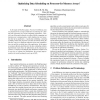Free Online Productivity Tools
i2Speak
i2Symbol
i2OCR
iTex2Img
iWeb2Print
iWeb2Shot
i2Type
iPdf2Split
iPdf2Merge
i2Bopomofo
i2Arabic
i2Style
i2Image
i2PDF
iLatex2Rtf
Sci2ools
122
click to vote
IPPS
1998
IEEE
1998
IEEE
Optimizing Data Scheduling on Processor-in-Memory Arrays
In the study of PetaFlop project, Processor-In-Memory array was proposed to be a target architecture in achieving 1015 floating point operations per second computing performance. However, one of the major obstacles to achieve the fast computing was interprocessor communications, which lengthen the total execution time of an application. A good data scheduling, consisting of finding initial data placement and data movement during the run-time, can give a significant reduction in the total communication cost and the execution time of the application. In this paper, we propose efficient algorithms for the data scheduling problem. Experimental results show the effectiveness of the proposed approaches. Compared with default data distribution methods such as row-wise or column-wise distributions, the average improvement for the tested benchmarks can be up to 30.
Data Scheduling | Distributed And Parallel Computing | Execution Time | IPPS 1998 | Total Execution Time |
Related Content
| Added | 05 Aug 2010 |
| Updated | 05 Aug 2010 |
| Type | Conference |
| Year | 1998 |
| Where | IPPS |
| Authors | Yi Tian, Edwin Hsing-Mean Sha, Chantana Chantrapornchai, Peter M. Kogge |
Comments (0)

